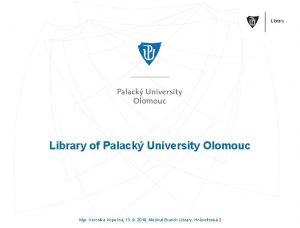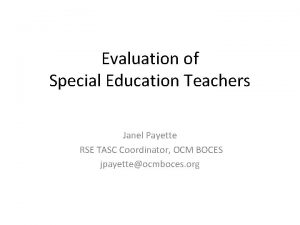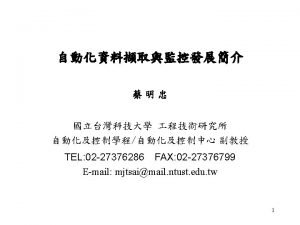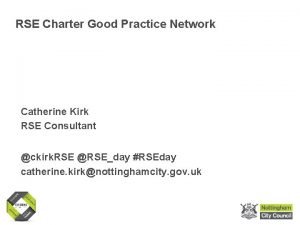Wifi Network Name RSE Guest Password RSE 826826
















- Slides: 16

Wifi • Network Name: RSE Guest • Password: RSE 826826

Burden of Disease Methodological workshop Royal Society of Edinburgh Scotland Grant Wyper Senior Researcher gwyper@nhs. net 15 th-16 th September, 2016 Burden of Disease Methodological Workshop, 15 -16 th September 2016 Royal Society of Edinburgh, Scotland

Welcome to Scotland

Scottish National Burden of Disease, Injuries and Risk Factors Study Development and preliminary findings Dr Diane Stockton Principal Investigator diane. stockton@nhs. net

Scottish Public Health Observatory collaboration • NHS National Services Scotland, provides health information, health intelligence, statistical services and advice that support the NHS in Scotland in progressing quality improvement in health and care and facilitating robust planning and decision making. They maintain and analyse all routinely collected national health data. • NHS Health Scotland is the national agency for improving population health and reducing inequalities in health. Its work covers every aspect of health improvement, from gathering evidence, to planning, delivery and evaluation, and spans all the wider determinants that can impact on health.

Introducing our other Scottish colleagues Project Board: • Prof Harry Campbell – Project Board chair • Oliver Harding – consultant in a local public health department • Marjorie Marshall – Scottish Government economist Future users of the BOD results: • Mag Mc. Fadden –Scottish Government analyst • Neil Craig – Health economist • Louise Marryat – Researcher

Scottish National Burden of Disease, Injuries and Risk Factors study Idea formed in 2011 Project started in July 2013 Initially funded through an NHS grant for 2 years… Publishing results in January 2017

Aims (1) • Provide comprehensive data on health needs to support rational resource allocation. • To identify inequalities in the burden of disease across sub-populations and socio-economic groups. • To analyse the contribution to this burden of selected risk factors. • To provide epidemiological information against which to compare the relative impacts of interventions in reducing the burden of disease and to inform economic evaluation of those interventions.

Aims (2) • To help address the future challenges posed by the ageing of the population, changes in disease and risk factor patterns, and the increasing costs of health services through the production of projections of the disease burden. • To assess whether the large effort to undertake a Burden of Disease study for Scotland, is warranted, by comparing our results to the results that can be obtained for Scotland from the GBD study.

Scottish BOD study – DALY components I. List of diseases (GBD organisational disease classification) II. Mortality (Scottish data and Scottish age-gender-deprivation specific life tables) III. Morbidity I. II. III. IV. Prevalence (Scottish data, clinical advice and literature reviews) Severity distributions (GBD severity distributions used but some exploratory analysis looking at impact of using local distributions) Disability weights (GBD weights used) Comorbidity (Scottish data and methods) IV. Uncertainty (Scottish methods)

Scottish National Burden of Disease, Injuries and Risk Factors Study Preliminary findings

PRELIMINARY RESULTS Top 10 crude DALYS in Scotland (44% of estimated burden) Disease Ischemic heart disease Chronic obstructive pulmonary disease GBD 2013 Scotland 2012 130, 476 110, 869 ê s 65, 281 65, 843 ê Trachea, bronchus, and lung cancers 75, 835 65, 000 Cerebrovascular disease 70, 773 48, 049 ê Neck and low back pain 179, 094 44, 373 ê Other musculoskeletal disorders Alzheimer's disease and other dementias Non-infective inflammatory bowel disease é 26, 612 39, 074 ê 47, 989 37, 237 é 8, 499 29, 850 Oral disorders 19, 582 29, 641 é Cirrhosis 30, 075 29, 352 s

Scottish National Burden of Disease, Injuries and Risk Factors Study Plans for the future

Activity to end March 2017 • Continued engagement with clinicians, epidemiologists and policy colleagues to refine estimates (now-Dec 2016) • Overall results by age, sex and socio-economic group published on our website – report and excel spreadsheets (January 2017) • Technical report published (January 2017) • Risk factor work (ongoing) • Projections work undertaken and published on our website (March 2017) • Topic specific scientific papers written (ongoing) • Promotion of results through presentations to government policy colleagues and planners; short briefing papers written (Dec 16 -March 17)

Activity after March 2017 • Funding for the analytical/research team uncertain after March 2017. Options being explored to avoid loss of expertise gained. • PI and clinical advisors will continue to promote the work within their roles. • Health economist colleagues will pick up the data for economic analysis and planning

www. scotpho. org. uk http: //www. scotpho. org. uk/comparative-health/burden-of-disease diane. stockton@nhs. net
 Ncsu wifi
Ncsu wifi Meraki wireless best practices
Meraki wireless best practices Church wifi password
Church wifi password Lcps secure wifi password
Lcps secure wifi password At&t wifi password list default
At&t wifi password list default Upol wifi password
Upol wifi password Ndsu eduroam
Ndsu eduroam Daconi
Daconi What is rse
What is rse Rse steps
Rse steps Evaluation rse
Evaluation rse What is rse
What is rse Rse nrse
Rse nrse Ciscoairprovision
Ciscoairprovision Name all the lines name all the segments name all the rays
Name all the lines name all the segments name all the rays Marc wifi
Marc wifi Wireless onboarding
Wireless onboarding































